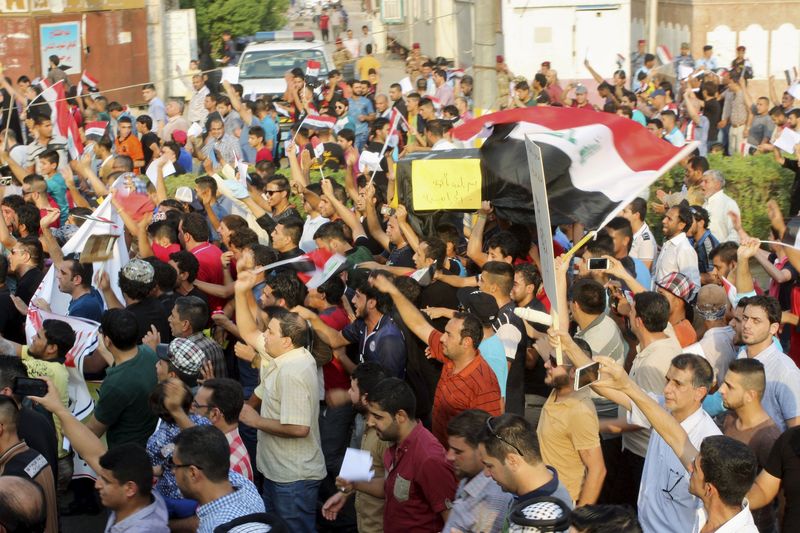By Mohammed Ati
AMARA, Iraq (Reuters) - Iraqis complaining about corruption and poor services, epitomised by power cuts during a heatwave, took to the streets on Tuesday, underlining the pressures on a government struggling to fend off radical insurgents.
The unrest, though limited and largely peaceful, could weigh down the government of Prime Minister Haider al-Abadi just as its forces are gearing up for a fresh offensive to retake western Anbar province from Islamic State.
Witnesses said hundreds of demonstrators chanted against the government in the late afternoon heat in the provincial capital of Amara, about 300 km (185 miles) southeast of Baghdad, demanding electricity, jobs and government reforms.
Temperatures surpassing 50 degrees Celsius (122 Fahrenheit) across Iraq in recent days have exacerbated regular summer power shortages and prompted the government to declare a four-day holiday last weekend.
Anti-government protests in recent weeks have broken out in the southern cities of Basra, Najaf, Babil and Nasiriya as well as in the capital Baghdad on Friday.
"On top of Daesh, we have to suffer power outages," protesters in Amara chanted, using another term for Islamic State. A few demonstrators carried a coffin marked with the word 'parliament'.
Abadi, a moderate Shi'ite Islamist who took office nearly a year ago, is under pressure to roll back the militants' gains and improve economic conditions while navigating a polarised political landscape.
Iraq is struggling to attract foreign investment and diversify its revenue sources away from oil, whose price has plunged in the past year. Years of mismanagement and corruption continue to plague the OPEC member.
Grand Ayatollah Ali al-Sistani, Iraq's most important Shi'ite religious leader, accused previous governments of failing to improve basic services.
"What is shameful is that every government blames its predecessor and does not do what is necessary to ease the suffering of civilians," his spokesman Sheikh Abdul Mahdi al-Karbalai said during a Friday sermon.
Iraq's electricity grid has been worn down by years of war and under-investment. It will probably supply only 11,000 megawatts of Iraq's 21,000-megawatt peak demand this summer, the electricity minister told parliament last week.

Electricity supplies collapsed in the chaos after the U.S. invasion in 2003 when power plants were looted or not properly maintained. Islamist insurgents have targeted transmission towers and other infrastructure in subsequent years.